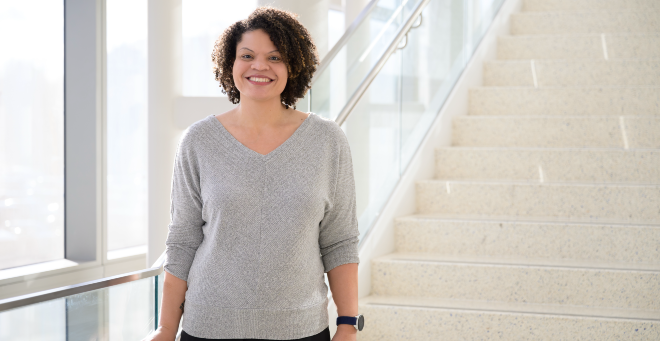
A four-day anti-racism in medicine course is now required learning for T.H. Chan School of Medicine students as part of an institutional goal to expand health equity, diversity and inclusion topics in the curriculum and to meet requests from students for the material.
“Recognizing the role of race and racism in health care is important,” said Sarah Forrester, PhD, assistant professor of population & quantitative health sciences, who led the pilot course. “The goal is not to feel guilty about it, but to recognize it, and then go forward.” She hopes the curriculum builds awareness in future physicians by incorporating this topic into education. ”Racism affects everybody—it’s everybody’s problem and everybody’s solution,” she said.
“I hope we don’t forget the history of racism in medicine. That history may have happened 100 years ago, but that 100 years is going to be with us in the room when we see our patients.”
Formerly, the topic of racism in medicine was covered briefly in an early clinical learning course. Now it has been expanded to four days, covering racism in history and medicine, and discussing ways to identify and interrupt racist experiences in a hospital setting.
“Based on student feedback after my one-day lecture, students wanted this subject matter woven through their whole medical education,” said Dr. Forrester. “I didn’t realize how regimented medical education was. I commend the school for listening to the students to make this happen.”
Joseph Distefano, MPH, is one of the second-year medical students who took Forrester’s course last summer. A first-generation college student who immigrated to the U.S. and was raised by a single mother, he hopes to pursue obstetrics and gynecology after medical school.
“There are disparate health outcomes for people of color, like poor birth outcomes for Black and indigenous women, or higher rates of certain cancers in Black populations,” said Distefano. “How a physician behaves toward certain patient populations has a very tangible impact. That slight change in attitude or tone is just as important as giving the right medication or getting the right sort of test.”
Forrester is a social epidemiologist who has conducted research on how structural and social factors—particularly race-based factors—affect physical health, chronic disease and mental health.
“Because of the political landscape of this country, anti-racism has become a buzz word or a dirty word,” she said. “Racism and white supremacy are woven into the building of this country. It doesn’t just affect Black people’s health or minority people’s health—it affects everybody’s health.”
“To me, this course feels just as important as any other block learning about nephrons in the kidney,” said Distefano. “I hope we don’t forget the history of racism in medicine. That history may have happened 100 years ago, but that 100 years is going to be with us in the room when we see our patients.”

